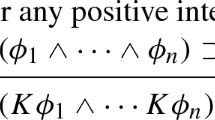Abstract
Two approaches for defining common knowledge coexist in the literature: the infinite iteration definition and the circular or fixed point one. In particular, an original modelization of the fixed point definition was proposed by Barwise (1989) in the context of a non-well-founded set theory and the infinite iteration approach has been technically analyzed within multi-modal epistemic logic using neighbourhood semantics by Lismont (1993). This paper exhibits a relation between these two ways of modelling common knowledge which seem at first quite different.
Similar content being viewed by others
References
Aczel P., 1988,Non-Well-Founded Sets, Center for the Study of Language and Information, Stanford.
Aumann R., 1976, ‘Agreeing to Disagree’,The Annals of Statistics 4, 1236–1239.
Bacharach M., 1993, ‘When Do We Have Information Partitions?’, in M. Dempster et al., eds.,Mathematical Models in Economics, Oxford: Oxford University Press.
Barwise J., 1989,The Situation in Logic, Center for the Study of Language and Information, Stanford.
Barwise J. and J. Etchemendy, 1987,The Liar. An Essay on Truth and Circularity, Oxford: Oxford University Press.
Binmore K., 1991, ‘Foundations of Game Theory’, mimeo, London: University College.
Chellas B.F., 1980,Modal Logic. An Introduction, Cambridge: Cambridge University Press.
Fagin R., J. Y. Halpern and M. Y. Vardi, 1984, ‘A Model-Theoretic Analysis of Knowledge’, inProc. 25th IEEE Symp. on Foundations of Computer Science, 268–278. A revised and expanded version appeared inJournal of the Association of Computing Machinery 38, 382–428, 1991.
Fagin R. and M.Y. Vardi, 1984, ‘An Internal Semantics for Modal Logics’, inProc. 17th ACM Symposium on Theory of Computing, Providence, 305–315.
Forti M. and F. Honsell, 1983, ‘Set Theory with Free Construction Principles’,Annali Scuola Normale Sup. di Pisa, Classe di Sc., Series IV, X (3): 493–522.
Halpern J.Y. and Y.O. Moses, 1984, ‘Knowledge and Common Knowledge in a Distributed Environment’, inProc. 3rd ACM Conference on Principles of Distributed Computing, New-York, 50–61. A revised and expanded version appeared inJournal of the Association of Computing Machinery 37, 549–587, 1990.
Halpern J.Y. and Y.O. Moses, 1985, ‘A Guide to the Modal Logic of Knowledge’, inP roc. 9th International Joint Conference on Artificial Intelligence (IJCAI-85), New-York, 480–490.
Halpern J.Y. and Y.O. Moses, 1992, ‘A Guide to Completeness and Complexity for Modal Logics of Knowledge and Belief,Artificial Intelligence 54, 319–379.
Hinnion R., 1992, ‘A propos de l'anti-fondation’,Cahiers du Centre de Logique 7, 69–95, Academia-Erasme, Louvain-la-Neuve.
Hintikka J., 1962,Knowledge and Belief, Ithaca: Cornell University Press.
Lewis D.K., 1969,Convention. A Philosophical Study, Harvard: Harvard University Press.
Lismont L., 1992, ‘Une classe universelle anti-fondée pour les croyances’,Comptes-Rendus de l'Académie des Sciences de Paris 315, Série I, 1117–1120.
Lismont L., 1993, ‘La connaissance commune en logique modale’,Mathematical Logic Quarterly (formerly:Zeitschrift für Mathematische Logik und Grundlagen der Mathematik) 39, 115–130.
Lismont L. and P. Mongin, 1993a, ‘Belief Closure: A Semantics of Common Belief and Common Knowledge of Modal Prepositional Logic’, CORE Discussion Paper, Université Catholique de Louvain.
Lismont L. and P. Mongin, 1993b, ‘La connaissance commune: une sémantique pour la logique modale’,Logique et Analyse 133–134, 133–149.
Mertens J.-F. and S. Zamir, 1985, ‘Formulation of Bayesian Analysis for Games with Incomplete Information’,Internationaljournal of Game Theory 14, 1–29.
Mongin P., 1993, ‘Some Connections between Epistemic Logic and the Theory of Nonadditive Probability’, in P. Humphreys (editor),Patrick Suppes, Mathematical Philosopher, Kluwer Academic Publishers, Dordrecht.
Mongin P., forthcoming, ‘Une interprétation logique du théorème de Mertens et Zamir’, in J. Dubucs and F. Lepage, eds.,Intelligence artificielle et logiques non-classiques: le point de vue philosophique, Hermès, Paris.
Vardi M.Y., 1986, ‘On Epistemic Logic and Logical Omniscience’, in J.Y. Halpern (editor),Proc. 1st Conference on Theoretical Aspects of Reasoning about Knowledge, Morgan Kaufmann Publishers, Los Altos, 293–305.
Author information
Authors and Affiliations
Additional information
A first version of this paper was written while the author was an assistant at the Universite Catholique de Louvain. It was part of a doctoral thesis presented in June 1992.
Rights and permissions
About this article
Cite this article
Lismont, L. Common knowledge: Relating anti-founded situation semantics to modal logic neighbourhood semantics. J Logic Lang Inf 3, 285–302 (1994). https://doi.org/10.1007/BF01160019
Received:
Revised:
Issue Date:
DOI: https://doi.org/10.1007/BF01160019




